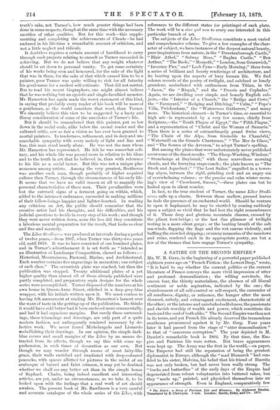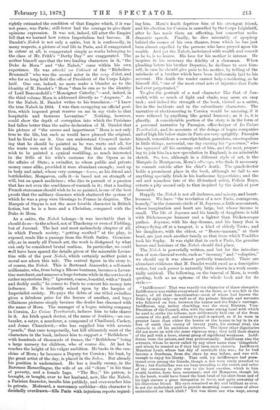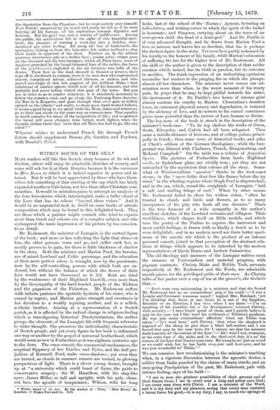A SATIRE ON THE SECOND EMPIRE.*
Ma. W. R. GREG, in the beginning of a powerful paper published eighteen years ago on "French Fiction: the Lowest Deep," wrote, "It is hard to say whether the current politics or the current literature of France conveys the more vivid impression of utter and profound demoralisation ; the willing servitude, the craven fear, the thirsty materialism, the absence of all liberal sentiment or noble aspiration, indicated by the .one ; the abandonment of all self-control or self-respect, the surrender of all manliness, dignity, or reticence, the hunger after the most diseased, unholy, and extravagant excitement, characteristic of the other; or the intense and unrebuked selfishness, the passionate and slavish worship of wealth and power, which constitute the basis and the soul of both alike." The Second Empire was then not in its teens, and yet French life already deserved the tremendous anathema pronounced against it by Mr. Greg. Four years later it had passed from the stage of " utter demoralisation " to that of " cancerous corruption." The year depicted in M. Daudet's remarkable book is 1864. By that time, the Em- pire and Parisian life were rotten. But brave appearances were kept up. The Army was the first in the world,—on paper. The Emperor had still the reputation of being the greatest diplomatist in Europe, although the "mad Bismarck "had con- fided to his sister, Malvina, his belief that his friend of Biarritz was not only broken, but had never been really strong. The "bucks :and butterflies" of the early days of the Empire had degenerated from robust voluptuaries into battered rakes, but they "made up," painted, and physicked themselves into an appearance of strength. Even in England, comparatively few
* The Nabob: a Story of Parisian Life and Manners. By Alphonse Daudet. Translated by E. Olavequin. 8 vols. London: Smith, Elder, and Co. 1878.
rightly estimated the condition of that Empire which, if it was not peace, was Paris ; still fewer had the courage to give their opinions expression. It was not, indeed, till after the Empire fell that we learned how rotten Imperialism had become. M. Daudet's Nabob is not only a satire, but it is confessedly, in many respects, a picture of real life in Paris, and if exaggerated in colour at all, is exaggerated simply as works belonging to the class of Mr. Frith's " Derby Day " are exaggerated. The author himself says that the two leading characters in it, " the Duke de Mora" and "the Nabob," came within his own experience. He was attackg an Cabinet of the " Richelieu- Brnmmell " who was the second actor in the coup d'6tat, and who for so long held the office of President of the Corps Legis- latif. One can, indeed, no more make a blunder as to the identity of M. Daudet's " Mora " than he can as to the identity of Lord Beaconsfield's " Monsignor Catesby,"—and, indeed, in the third volume Mora is addressed directly as " Auguste." As for the Nabob, M. Daudet writes to his translator,—" I knew the true Nabob in 1864. I was then occupying an official posi- tion, which imposed great reserve on me in my visits to that hospitable and fastuous Levantine." Nothing, however, could show the depth of corruption into which the Parisians had fallen better than the naive declaration of M. Daudet that his picture of "the serene and impertinent" Mora is not only true to the life, but such as would have pleased the original, had he lived to see it. One can understand Cromwell insist- ing that he should be painted as he was, warts and all, for the warts were not of his making. But that a man should wish to be painted a cynical worldling, as much interested in the frills of his wife's costume for the Opera as in the affairs of State ; a swindler, to whom public and private money came alike, provided it were abundant enough ; used up in body and mind, whose very courage—tenue, as his friend and bottleholder, Monpavon, calls it—is based not on strength of will, but on quack medicines ; who dies in pursuit of a passion that has not even the semblance of warmth in it ; that a leading French statesman should wish to be so painted, is one of the best proofs that the military disasters which shattered the system of which he was a prop were blessings to France in disguise. The Marquis of Steyne is not the most lovable character in British fiction, but he is a hero and a Christian, compared with the Duke de Mora.
As a satire, the Nabob belongs—it was inevitable that it should do so—to the school, not of Thackeray or even of Fielding, but of Juvenal. The last and most melancholy chapter of all, in which French society, " getting soothed " at the play, is exposed, reads like a passage from the Sixth Satire. Occasion- ally, as in nearly all French art, the work is disfigured by what can only be considered brutal realism. In particular, we could well have been spared the details given of the miserable Levan- tine wife of the poor Nabob, which certainly neither point a moral nor adorn this tale. The central figure in the story is, of course, the Nabob. This is Bertrand Jansoulet, a self-made millionaire, who, from being a Rhone boatman, becomes a Levan- tine merchant, and amasses a huge fortune while in the service of a rather mysterious Bey." Ignorant, coarse, boastful, with a " frank and fleshly smile," he comes to Paris to convert his money into influence. He is instantly seized upon by the harpies of Imperialist society. He pays the debts of one titled swindler, gives a fabulous price for the horses of another, and buys villainous pictures simply because the dealer has charmed with the name of Mora. The manager of a bogus mining company in Corsica, La Caisse Territoriale, induces him to take shares in it. An Irish quack doctor, of the name of Jenkins,—an em- bezzler, a satyr, a murderer, a compound of Chadbaud, Carker, and Jonas Chuzzlewit,—who has supplied him with arsenic "pearls," that cure temporarily, but kill ultimately most of the characters in the book, induces him to support a " Bethlehem " with hundreds of thousands of francs, the " Bethlehem " being a large nursery for children, who of course die. At last he reaches the height of his vulgar ambition. He basks in the sun- shine of Mora; he becomes a Deputy for Corsica; his bust, by the great artist of the day, is placed in the Salon,. But already his position is undermined. He has a deadly enemy, in the Baroness Hemerlingne, the wife of an old " chum " in his time of poverty, and a female Iago. "The Bey," his patron, is brought, or bought, over to her husband, now, like the Nabob, a Parisian financier, insults him publicly, and over-reaches him in private. Massarcl, a mercenary scribbler—this character is decidedly overdrawn—fills Paris with injurious reports regard-
ing him. Mora's death deprives him of his strongest friend, and his election for Corsica is cancelled by the Corps Legislatif, after he has made them an affecting, but somewhat melo- dramatic speech. Finally, he dies miserably of apoplexy behind the scenes of his own theatre, from which he has just been almost expelled by the persons who have preyed upon his wealth. And yet the Nabob, inebriated with wealth and conceit as he is, is no knave. His love for his mother is intense. He inspires in his secretary the fidelity of a clansman. When pleading before his brother Deputies, he declines to save him- self, in ease he should give pain to his mother, by telling of the misdeeds of a brother which have been deliberately laid to his account. His death the reader cannot help considering, as he himself did, "one of the most cruel acts of injustice that Paris had ever perpetrated."
To give the portrait of a real character like that of Jan- soulet, with so much of light and shade, may seem an easy task ; and indeed the strength of the book, viewed as a satire, lies in the incidents and in the subordinate characters. The narrative of electioneering in Corsica would be amusing, if it were relieved by anything like genial humour ; as it is, it is ghastly. A considerable portion of the story is in the form of a personal narrative by Passajon, office-keeper of La Caisse Territoriale, and its accounts of the doings of bogus companies and of high life below stairs in Paris are very sprightly. Passajon himself, venerable as a conscript-father, garrulous, unscrupulous in little things, mercurial, one day cursing his "governor," who has squeezed all his earnings out of him, and the next, prepar- ing to join him in a new speculation in England, is an admirable sketch. So, too, although in a different style of art, is the Marquis de Montpavon, Mora's alter ego, who finds it necessary to commit suicide after his chief's death. The quack-doctor holds a prominent place in the book, although we fail to see anything specially Irish in his loathsome hypocrisies ; and the sad and nameless fate of the ill-trained artist, Felicia Rays, extorts a pity second only to that inspired by the death of poor Jansoulet.
Happily the Nabob is not all darkness, and misery, and heart- lessness. We have "the revelation of a new Paris, courageous, homely," in the domestic circle of M. Joyeuse, a little accountant, whose imagination and heart are large, but whose income is small. The life of Joyeuse and his family of daughters is told.
with Dickensesque humour and a lighter than Dickensesque pathos. Joyeuse, with his day-dreams, and his fancy that is always flying off at a tangent, is a kind of elderly Toots ; and his daughters, with the eldest, or " Bonne-maman," at their head, are just such another family as that from which Traddles took his Sophy. It was right that in such a Paris, the genuine heroes and heroines of the Nabob should find place.
The Nabob is powerfully written, and but for the introduc- tion of non-classical words, such as " insomny " and " voluptiesr we should say it was almost perfectly translated. There are abundant evidences that M. Daudet would excel as a descriptive writer, but such power is naturally little shown in a work essen- tially satirical. The following, on the funeral of Mora, is worth quoting, both as an epitome of the whole book and for its style :—
" Indifference ! That was exactly the character of those obsequies. Indifference was visible everywhere on the faces, as it was felt in the hearts, of all those functionaries—most of whom had known the Duke by sight only—as well as of the private friends and servants who followed on foot, between the hearse and the Duke's carriage. Indifferent, nay, rather chuckling, was the stout Minister, Vice- President of the Council, who, with the same strong hand with which he used to strike the tribune, now deliberately held one of the front corners of the pall, and seemed to pull it onward, as if he were in greater haste than either the horses or the hearse to lay in its six feet of earth that enemy of twenty years, his eternal rival, the obstacle to all his ambitious schemes. The three other dignitaries did not move on with the same vigorous step ; they held their shares of the pall with a loose, absent grasp of significant weakness. Indif- ferent were the priests, and that professionally. Indifferent also the servants, whom he never called by any other name than thingabob,' and whom he treated as if they had been mere chattels. Indifferent Monsieur Louis, whose last day of servitude this was; for he had become a freedman, from the slave he was before, and was rich enough to enjoy his liberty. That cold, icy indifference had pene- trated even among the friends, though a few were really attached to Mora ; but Cardailhac was too busy attending to the march and order of the ceremony to give way to the least emotion, which in him would, besides, have been unnatural ; and old Monpavon, though hit in the heart, would have found the least bend of his shirt-front and of his high stature a great derogation to tame, and quite unworthy of his illustrious friend. His eyes remained as dry and brilliant as ever. Is not the undertaker paid to provide mourning tears—tears of silver embroidered orr black cloth ? Yet was there one whe wept, among the deputation from the Chamber; but he wept naively over himself. Poor Nabob ! unnerved by the music and pomp, he felt as if he were burying all his fortune, all his aspirations towards dignities and honours. But his grief was only a variety of indifference. Among the public, the satisfaction felt at the sight of this beautiful spec- tacle, the pleasure of turning a week-day into a holiday, over- mastered any other feeling. All along the line of boulevards, the spectators, looking on from the balconies, felt rather inclined to clap their bands in approval of the show. Farther on, in the artisan quarters, irreverence put on a bolder face; coarse jokes, vulgar puns on the deceased and his love-intrigues, which all Paris knew, roars of laughter provoked by the broad-brimmed hats of the rabbis, the faces of the prad'hommes, exploded in the air between two rolls of the drums. Their feet in the mud, dressed in blouses or jerseys, their caps off in obedienCe to custom, were to be seen men who represented misery, compulsory labour, enforced idleness, or strikes, and who stared sneeringly at this last pageant of the brilliant Duke,—that inhabitant of another sphere, bereft now of all his honours, and who probably had never before visited this part of the town. But you see, in order to go to yonder cemetery, it is absolutely necessary to follow the common road, and go along the Faubourg Saint-Antoine, the Rue de In Roquette, and pass through that °eh-0i gate so widely opened on the infinite! and really, to those poor, hard-worked fellows, it seems a good thing to see great lords like Mora, dukes and ministers, go to their last abode by the same way as common men. That equality in death consoles for many of the inequalities of life ; and to-morrow the bread will seem cheaper, wine better, work lighter, when the -thought strikes them that even that old More has had to go, like any other !' " Whoever wishes to understand French life through French fiction should supplement Dumas fits, Gautier, and Feydeau, with Daudet's Nabob.




































 Previous page
Previous page